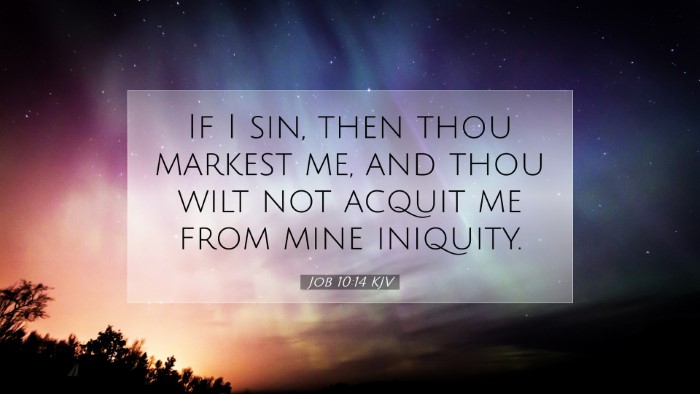Old Testament
Genesis Exodus Leviticus Numbers Deuteronomy Joshua Judges Ruth 1 Samuel 2 Samuel 1 Kings 2 Kings 1 Chronicles 2 Chronicles Ezra Nehemiah Esther Job Psalms Proverbs Ecclesiastes Song of Solomon Isaiah Jeremiah Lamentations Ezekiel Daniel Hosea Joel Amos Obadiah Jonah Micah Nahum Habakkuk Zephaniah Haggai Zechariah MalachiJob 10:14
Job 10:14 KJV
If I sin, then thou markest me, and thou wilt not acquit me from mine iniquity.
Job 10:14 Bible Commentary
Job 10:14 (KJV): "If I sin, thou markest me, and thou wilt not acquit me from mine iniquity."
Introduction
The book of Job is a profound exploration of suffering, divine justice, and human existence. In Job 10:14, Job addresses God directly, expressing his anguish and grappling with the implications of his sin. This verse encapsulates the themes of guilt, divine scrutiny, and the human search for vindication in the face of suffering. Here, we draw insights from prominent public domain commentaries to illuminate the depth of this text.
Contextual Analysis
Job, in the progression of his dialogues, moves from a passionate lamentation of his circumstances to a theological inquiry into God's justice and his own righteousness. Chapter 10 signifies a shift where Job confronts God more directly, shedding light on his understanding of sin and the divine character.
Commentary Insights
-
Matthew Henry’s Commentary:
Henry emphasizes Job's plea as one of a deeply troubled heart. He notes that Job feels the weight of his sins upon him, suggesting that God's omniscience leads to a sense of inevitable judgment. Henry highlights that Job recognizes his imperfection but is unsettled by the perceived lack of mercy from God. His commentary suggests that Job's view of God seems overly punitive, indicating a struggle to reconcile God's justice with his personal suffering.
-
Albert Barnes’ Notes:
Barnes expounds on the relationship between sin and suffering, proposing that Job’s anguish reflects a broader theological dilemma—why the righteous suffer while the wicked prosper. He points out that Job believes that God has marked his sins, intensifying his fear of judgment. Barnes argues that Job’s lament reveals a paradox: the righteous may suffer greatly, but they can also have hope in God's ultimate justice. This introspection leads to a deeper understanding of grace amidst distress.
-
Adam Clarke’s Commentary:
Clarke provides a historical and linguistic approach to the text, noting the Hebrew nuances in the original wording. He suggests that Job’s assertion of being marked for his sins indicates a belief that his suffering is a direct result of divine punishment. Clarke also articulates the psychological implications of Job's statement, suggesting that it reveals a man's struggle with guilt and the desire for reconciliation with God. His commentary encourages readers to view Job’s plea not just as a cry of despair, but as an invocation of faith, trusting in God's eventual mercy.
Theological Implications
Job 10:14 raises significant questions about divine justice and grace. It invites theological reflection on the nature of sin and God’s response to human frailty. Job’s fear reflects a common human concern about the nature of suffering—particularly in relation to sin. The verse serves as a reminder for theologians and students of the complexity of God's justice, where His mercy coexists with His righteousness.
Application for Believers
This passage is particularly relevant for pastors and lay leaders who engage with the suffering of their congregations. It encourages a compassionate response to those who feel marked by their past iniquities. Job’s expression can foster an environment where believers confront their guilt while also seeking God’s redemptive grace. The acknowledgment of sin does not preclude the hope for acquittal—a central theme in Christian doctrine that resonates with the heart of the Gospel.
Reflective Questions for Further Study
- How does Job's understanding of sin influence his view of God?
- In what ways can we apply Job’s struggle to modern experiences of suffering and guilt?
- What does this verse teach us about the interplay between divine justice and mercy?
Conclusion
Job 10:14 invites deep introspection about the nature of sin and God’s response to human suffering. The combined insights of Henry, Barnes, and Clarke illuminate the complex relationship between human fallibility and divine justice, provoking vital discussions for scholars and practitioners alike. As we explore the depths of this passage, may we find solace in the understanding that God is both just and merciful, ever ready to listen to our cries.


